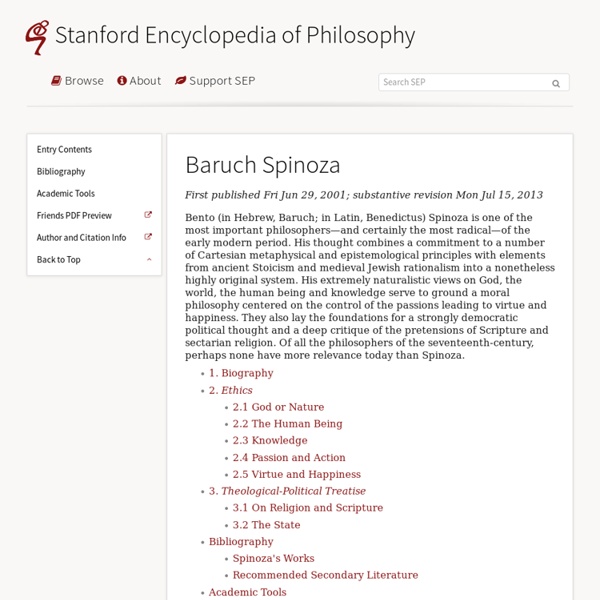spinoza.fr › Une lecture continue de l’Ethique de Spinoza
Reason
Psychologists and cognitive scientists have attempted to study and explain how people reason, e.g. which cognitive and neural processes are engaged, and how cultural factors affect the inferences that people draw. The field of automated reasoning studies how reasoning may or may not be modeled computationally. Animal psychology considers the question of whether animals other than humans can reason. Etymology and related words[edit] In the English language and other modern European languages, "reason", and related words, represent words which have always been used to translate Latin and classical Greek terms in the sense of their philosophical usage. The original Greek term was "λόγος" logos, the root of the modern English word "logic" but also a word which could mean for example "speech" or "explanation" or an "account" (of money handled).[7]As a philosophical term logos was translated in its non-linguistic senses in Latin as ratio. Philosophical history[edit] Classical philosophy[edit]
Fallacy List
1. FAULTY CAUSE: (post hoc ergo propter hoc) mistakes correlation or association for causation, by assuming that because one thing follows another it was caused by the other. example: A black cat crossed Babbs' path yesterday and, sure enough, she was involved in an automobile accident later that same afternoon. example: The introduction of sex education courses at the high school level has resulted in increased promiscuity among teens. A recent study revealed that the number of reported cases of STDs (sexually transmitted diseases) was significantly higher for high schools that offered courses in sex education than for high schools that did not. 2. example: Muffin must be rich or have rich parents, because she belongs to ZXQ, and ZXQ is the richest sorority on campus. example: I'd like to hire you, but you're an ex-felon and statistics show that 80% of ex-felons recidivate. 3. example: All of those movie stars are really rude. 4. 5. 6. 7. 8. 9. 10. 11. example: Only man is rational. 12.
Het Spinozahuis - Rijnsburg (NL)
a good question - my attempt in answering it
Amsterdamse Spinoza Kring
To Live at All is Miracle Enough
I read Richard Dawkins book ‘Unweaving the Rainbow’ a little while ago and there was a part that really brought me up short with one of those ‘WOW’ moments. It really brings home the sheer unliklihood and odds against any of us actually being born and being able to experience and enjoy this only too brief sojourn on earth. I have been thinking about it quite a bit lately and really wanted to reread it again. Unfortunately I have lent it to a friend and so was having to wait for it to be returned. Imagine my delight therefore when I stumbled upon a website with a transcript of this part of the book (plus other good stuff). I think everyone should at least read this part so I reproduce it here, together with a link to the website. Excerpt from Chapter I, “The Anaesthetic of Familiarity,”of Richard Dawkins 1998 book Unweaving the Rainbow 'We are going to die, and that makes us the lucky ones. Napoleon started it all. This is another respect in which we are lucky.
Hyper-Spinoza
Perennial philosophy
The Perennial philosophy (Latin: philosophia perennis), [note 1] also referred to as Perennialism, is a perspective in the philosophy of religion which views each of the world’s religious traditions as sharing a single, universal truth on which the foundation of all religious knowledge and doctrine has grown. Agostino Steuco (1497–1548) coined the term philosophia perennis,[1] drawing on the neo-Platonic philosophy of Marsilio Ficino (1433–1499) and Giovanni Pico della Mirandola (1463–94). In the early 19th century this idea was popularised by the Transcendentalists. Towards the end of the 19th century the Theosophical Society further popularized the concept under the name of "Wisdom-Religion" or "Ancient Wisdom".[2] In the 20th century it was popularized in the English-speaking world through Aldous Huxley's book The Perennial Philosophy as well as by the strands of thought which culminated in the New Age movement. Definition[edit] Origins[edit] Neo-Platonism[edit] Steuco[edit]
Spinoza - Uni. Nantes
Philosophy of religion
Philosophy of religion is a branch of philosophy concerned with questions regarding religion, including the nature and existence of God, the examination of religious experience, analysis of religious vocabulary and texts, and the relationship of religion and science.[1] It is an ancient discipline, being found in the earliest known manuscripts concerning philosophy, and relates to many other branches of philosophy and general thought, including metaphysics, logic, and history.[2] Philosophy of religion is frequently discussed outside of academia through popular books and debates, mostly regarding the existence of God and problem of evil. The philosophy of religion differs from religious philosophy in that it seeks to discuss questions regarding the nature of religion as a whole, rather than examining the problems brought forth by a particular belief system. It is designed such that it can be carried out dispassionately by those who identify as believers or non-believers.[3] [edit] Aquinas
Gilles Deleuze
Belief
Belief is a mental representation, treated in various academic disciplines, especially philosophy and psychology, of a sentient being's attitude toward the likelihood or truth of something.[1] From Greek two different concepts are often represented by the concept of belief: Pistis and Doxa. Simplified we may say that the first deals in trust and confidence, the latter in opinion and acceptance. Knowledge and epistemology[edit] The terms belief and knowledge are used differently in philosophy. As a psychological phenomenon[edit] Mainstream psychology and related disciplines have traditionally treated belief as if it were the simplest form of mental representation and therefore one of the building blocks of conscious thought. The concept of belief presumes a subject (the believer) and an object of belief (the proposition). This has important implications for understanding the neuropsychology and neuroscience of belief. Belief-in[edit] Belief-that, delusion[edit] Formation[edit] Desirability



